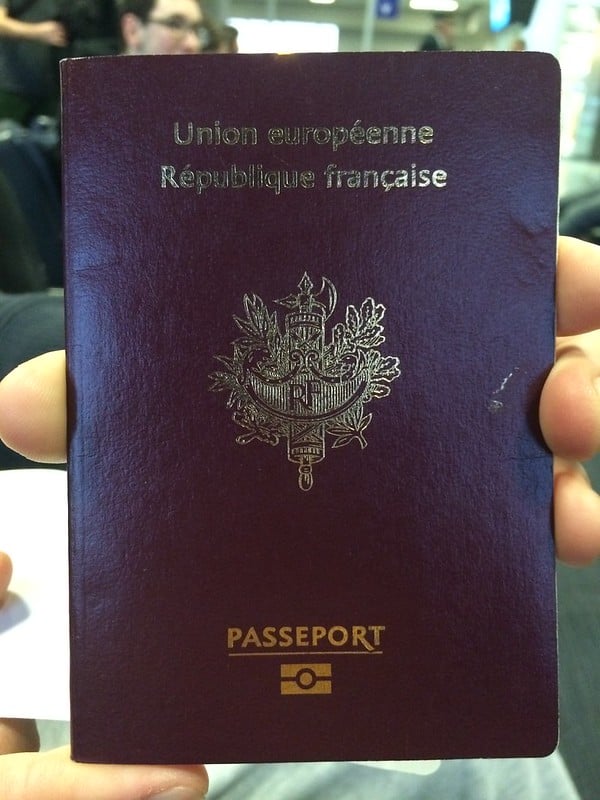French Citizenship Language Test in 2022: All You Need to Know About the TCF IRN
Have you lived in France for over 5 years and are thinking about getting French nationality? Are you an expat looking for work opportunities in one of the most beautiful countries in the world? Did you fall in love with a mysterious Frenchman?
If for any reason, you are thinking about relocating to France, there is one small thing you need to do before you can book your flight. We are talking about the nationality tests. No, it’s not a questionnaire on where they serve the best Bouillabaisse or the most delicious Salmon en papillote in Paris. It’s a French Citizenship Language Test, the TCF Intégration, Résidence et Naturalisation (TCF IRN).

Photo by https://www.wellingtonstravel.com via Flickr.
This test is going to be replacing the TCF pour l’accès à la nationalité française (TCF ANF) on January 3, 2022. So, if you plan to apply for citizenship after that date, this is the test you have to get ready for.
Below, you will find everything you need to know about the new exam, as well as tips from our French teacher Léa, a native of Lyon.
Let’s get started by delving into the content of the French Citizenship Language Test.
Table of Contents
→Sign Up Now: Free Trial French Lesson With a Native Speaker Teacher!←
Oral Comprehension
The oral comprehension test is composed of 20 multiple-choice questions, each of which has 4 options and only one correct answer.
These questions test the ability to understand common words and expressions from everyday communicative situations: dialogues, interviews, phone conversations etc.
Candidates need to demonstrate that they get the main ideas from exchanges and oral messages. This information is usually facts about people, news stories, current affairs, or professional matters.
A typical listening exercise might involve a picture depicting a familiar situation, like a mother telling off a child. In this case, the instruction could read: “Listen to the 4 propositions. Choose the one that matches the image and check a box on the answer sheet”.
- Go to bed quickly.
- Finish your French homework.
- Watch TV now.
- Come eat right away.
Written Comprehension
The questions in this section test students’ ability to understand the language used in communicative situations such as administrative messages, articles, reviews informal letters, ads, menus, and timetables.
Perhaps, the most challenging of these texts are those that deal with abstract topics, such as literary texts or specialised articles, as well as those in which the author takes a stand or gives an opinion. The texts, however, are extremely brief, and the format is the same as for the oral comprehension part: multiple choice questions with 4 options, of which only one is correct.
The texts are presented according to a principle of progressive difficulty. The last exercise in this section might involve a very brief text about French society and four prepositions such as these:
- The majority of children are looked after by their relatives.
- Mothers prefer to take care of their children on their own.
- The number of establishments meets the demand in Paris.
- Building more nursery schools will solve a big problem.
Oral Expression
This section tests the candidates’ ability to:
- talk about themselves, their environment, family and professional life.
- ask appropriate questions during a conversation.
- give their opinion, explain the advantages and disadvantages of a project, express agreement or disagreement.
- present complete arguments in a structured way.
Again, the oral expression section involves three tasks:
- a 2-minute interview without preparation
- a 3-minute interaction about a specific topic
- a 4-minute presentation on a question chosen by the examiner
Written Expression
When English speakers start to learn French, writing is usually the skill they dread the most. This is because French spelling rules —particularly, the relationship between what is written and what is said— differ greatly from how we do things in English. But don’t worry. The writing section on the French Citizenship Language Test is more interested in assessing candidates’ ability to explain and describe rather than linguistic accuracy.
The Writing Expression section consists of three tasks:
- In Task 1, candidates have to describe a person, a group of people, a place, or an object (30 to 60 words).
- In Task 2, candidates are asked to write a daily activity report (40 to 90 words)
- In Task 3, test-takers have to give their opinion about a place, an object, or a person (40 to 90 words).
What to Expect on the Day of the Exam
In order to prepare well for this exam, it is essential to know how a French Citizen Language Test is conducted, and what rules and protocols you should adhere to:
- Candidates are expected to be very punctual. In the event of a delay, the candidate cannot be admitted to the examination room and doesn’t have the right to ask for a refund.
- The reception will be carried out by an auditor who will ask you to present personal identification that includes a picture. Without it, the candidate cannot be admitted to the examination room.
- Once candidates are all in the room, the supervisor will inform them about:
-the nature and format of the tests
-the instructions for the tests
-the total duration of the tests
-the penalties incurred in the event of fraud
-the date of availability of the results
- For the oral comprehension part, each recording is played only once and the question is asked after listening to the audio document.
- Each interview will be recorded to be sent to France Éducation International for the second assessment of the test.
Tips and Tricks to Ace the French Citizenship Language Test
When we told Léa, our French teacher, that we would be writing about the TCF Intégration, Résidence et Naturalisation (TCF IRN), she asked us to give you the following tips.
Before the exam:
- Become familiar with the format of the test before you even register for it. Knowing what to expect helps you focus on the right abilities and reduces your anxiety levels.
- Read test samples. Tests often seem more dreary than they really are. Reading a few exams from previous years might help you see that, with the right preparation, there’s nothing in there you won’t be able to handle!
- Immerse yourself as much as you can in the French language by reading stories, watching television, or singing along to your favourite French songs. It’s important you continue to learn French until the last minute before taking the test!
- Along the same line, you should practise with native speakers as much as possible. Speaking and writing are the hardest skills to perfect (though listening is usually quite challenging too). If you can study with a qualified professional who can give you feedback and personalised advice, your chances of passing the test will be much greater!
→Sign Up Now: Free Trial French Lesson With a Native Speaker Teacher!←
During the test:
- Listen carefully to the instructions to avoid formal mistakes.
- Stay as relaxed as possible, especially during the oral tests. If you notice you’re too nervous, take deep breaths to lower your heart rate.
- Manage your time by assigning a specific number of minutes to every task.
Scoring
The TCF IRN assesses up to level B1 of the Common European Framework of Reference. Depending on your performance, you can get the following results:
- A1 not reached: 0 to 100 points
- A1: 101 to 199 points
- A2: 200 to 299 points
- B1: Over 300 points
Each candidate will receive a certificate that includes:
- A score for oral comprehension(listening) and a score for written comprehension (reading).
- A mark out of 20 for oral expression(speaking) and a mark out of 20 for written expression (writing).
- Besides your score, each one of your skills will also be classified into one of the levels of the Common European Framework of Reference for Languages (for example, A1).
- An indication of whether or not the level required for French naturalisation has been reached: “B1 reached” or “B1 not reached”.
- An indication of whether or not the candidate has reached the level to apply for a resident card in France “A2 reached” or “A2 not reached”.
To be able to present their certificate to governmental authorities, the candidate must have reached the level required for the application for a resident card, i.e. level A2.
To sum up, the French Citizenship Language Test is an exam that measures candidates’ abilities to handle the communicative challenges of using French in everyday situations. Rather than evaluating students’ grammar or accent, it assesses whether a candidate is ready or not to live in France and take part in all kinds of linguistic interactions without significant strain.
Not feeling ready to prove that just yet? Not a problem. If you contact us now, we will get you a free trial class with a French tutor so that you can start getting all the practice you need! In your first class, one of our teachers will assess your current level and learning style so they can come up with the best tailor-made syllabus just for you, all of this at no cost! Reach out to us now and we’ll get right back to you in one business day!



